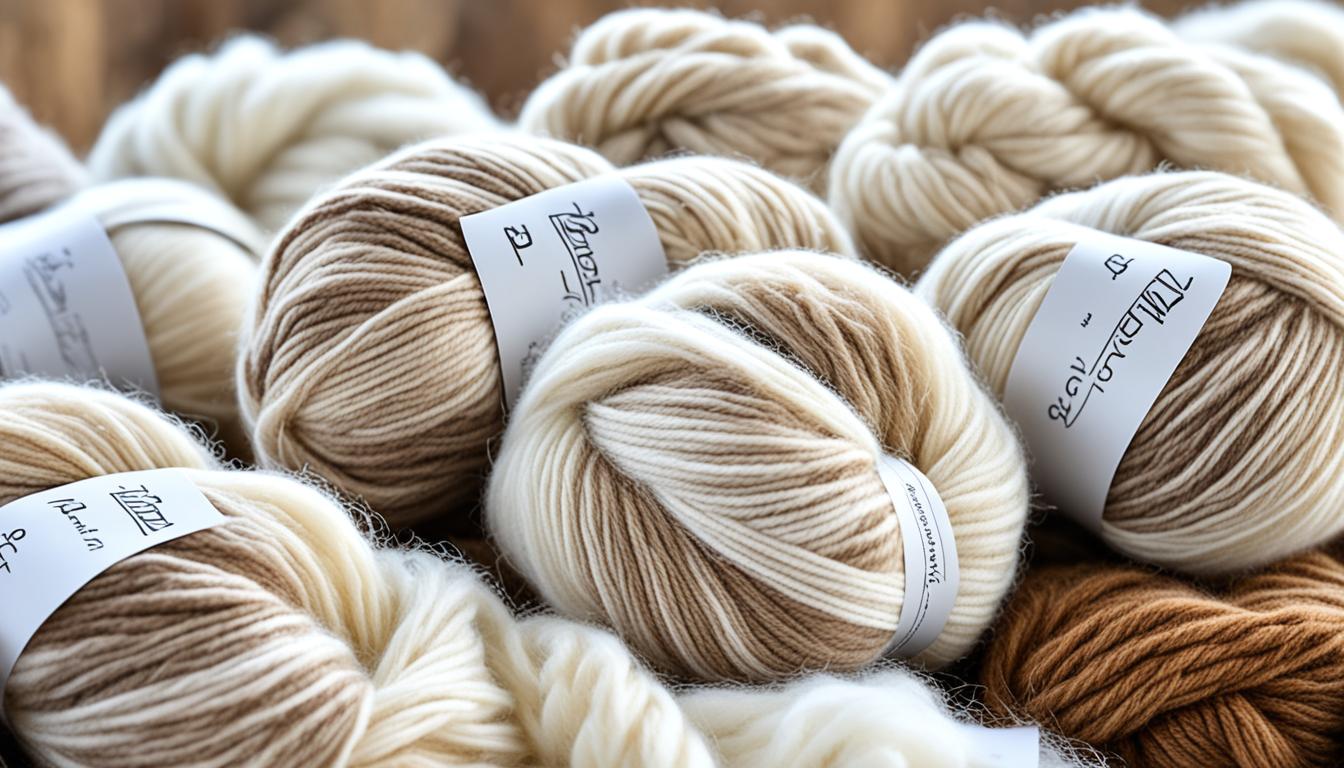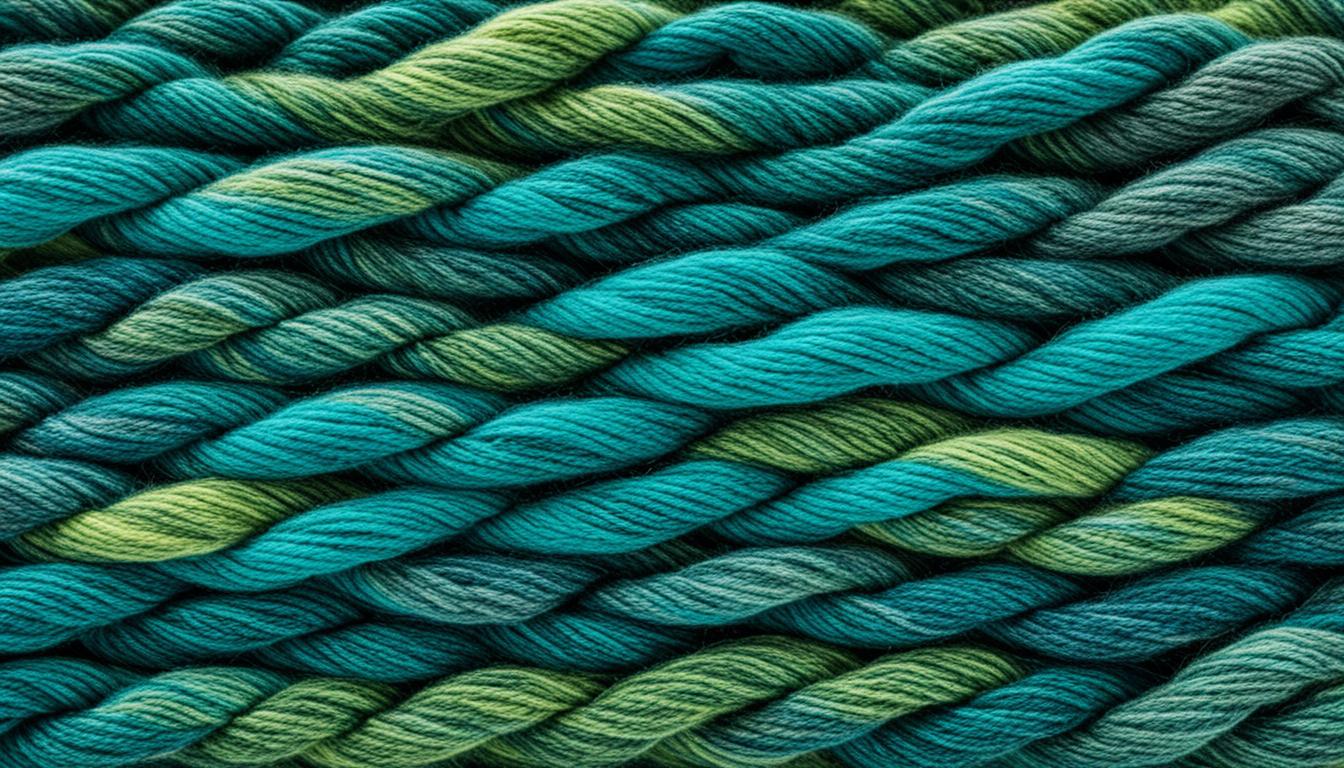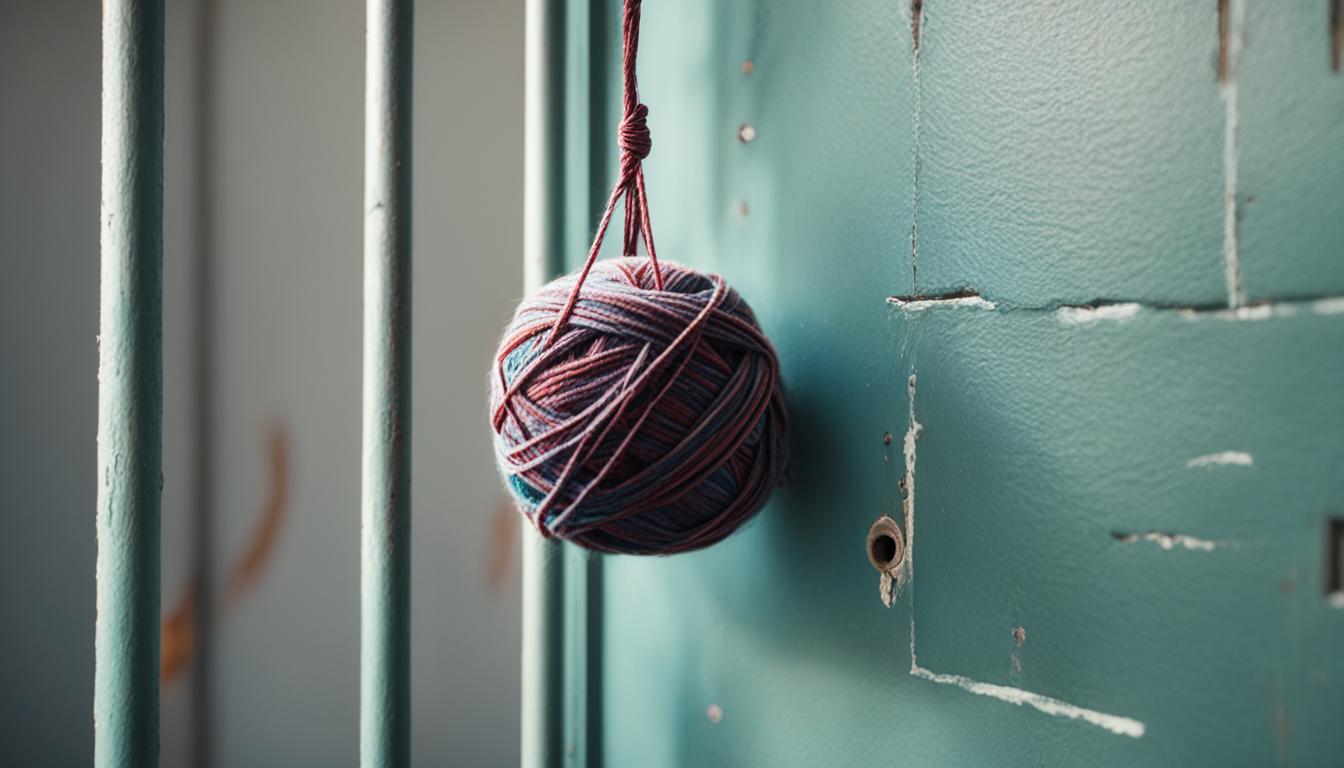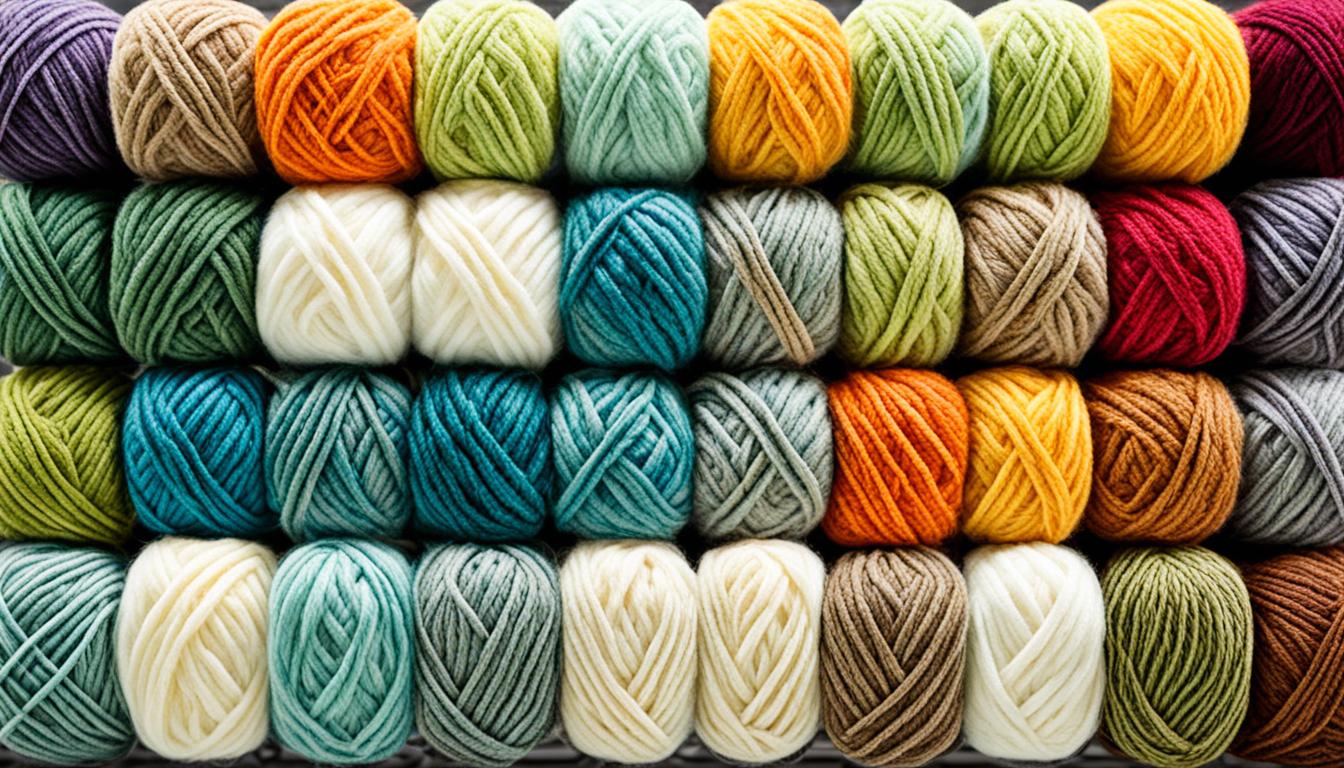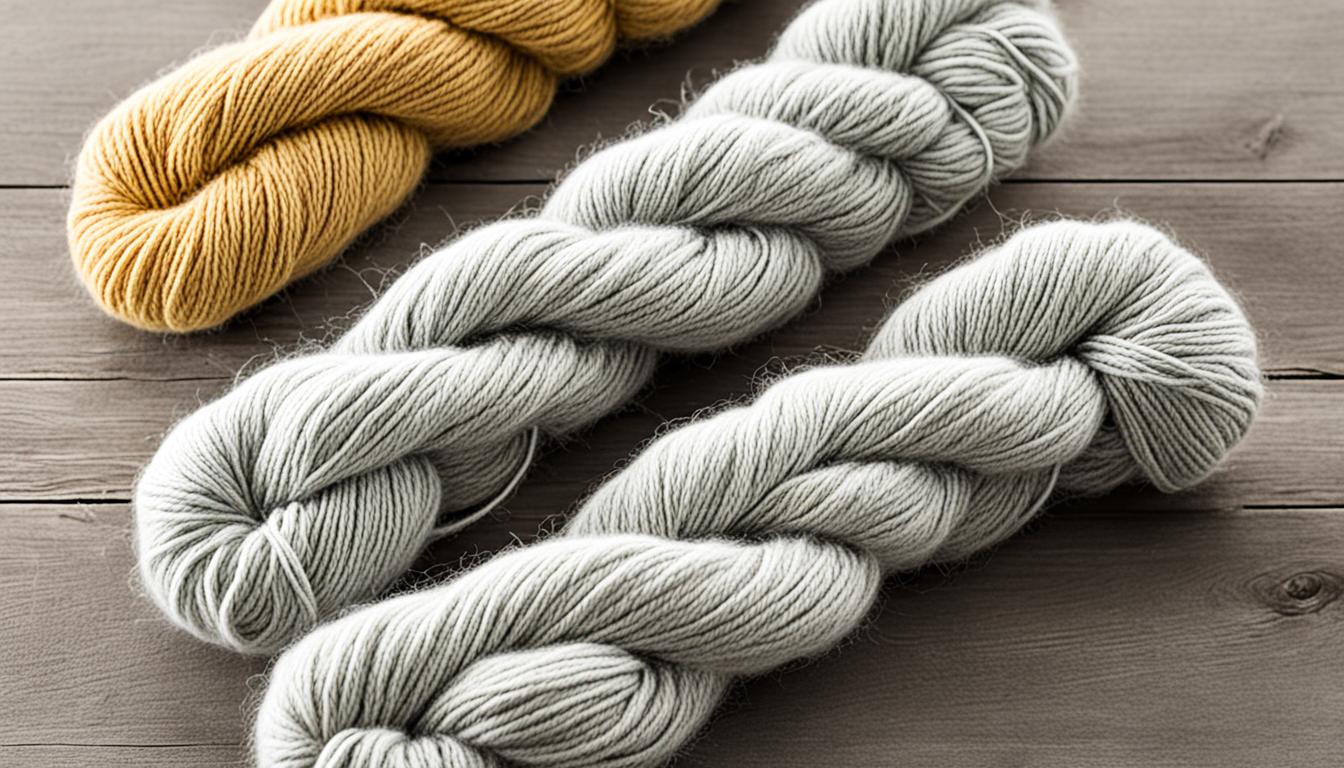Are you interested in knowing the price of alpaca yarn? Curious about how it stacks up against traditional sheep wool? Get ready to be fascinated by the unexpected elements that play a role in determining the cost of this luxurious fiber. From the rarity of alpaca fleece to the necessity of importing, we explore the world of alpaca yarn pricing in this detailed guide.
Key Takeaways:
- Alpaca yarn is more expensive than sheep wool due to supply and demand factors.
- Manufacturers pay about $2 per ounce for alpaca fleece, while sheep wool costs only $0.11 per ounce.
- The scarcity of alpacas in the United States and the need to import alpaca fiber contribute to the higher cost of alpaca yarn.
Factors Affecting Alpaca Yarn Cost
When it comes to the cost of alpaca yarn, several factors come into play. Understanding these factors can help you make an informed decision when you’re looking to buy alpaca yarn. Let’s explore the key elements that influence the pricing of alpaca yarn.
Type and Quality of Alpaca Fiber
The type and quality of alpaca fiber used in the yarn significantly impact its price. Different breeds of alpacas, such as Huacaya, Suri, and Baby Alpaca, produce different types of fiber, each with its unique qualities. Baby alpaca yarn, known for its incredible softness, usually comes at a higher price point. On the other hand, Huacaya and Suri alpaca yarns offer distinct textures and can vary in price based on their quality.
Processing and Manufacturing Techniques
The way alpaca fiber is processed and manufactured plays a vital role in determining the final cost of the yarn. Processes like spinning, dyeing, and blending can add value to the yarn but also increase its price. For instance, hand-spun alpaca yarn that requires skilled craftsmanship may be priced higher compared to machine-spun yarn.
Brand and Reputation
The brand and reputation of the manufacturer or supplier can also influence the cost of alpaca yarn. Well-known brands that have established a reputation for high-quality products and ethical sourcing may charge a premium for their yarn. However, such brands often provide assurance of superior yarn quality and support sustainable practices.
Additional Expenses
When calculating the overall price of alpaca yarn, it’s essential to consider any additional expenses that may be involved. These expenses can include shipping costs, import fees, or any other charges that might arise if you’re purchasing the yarn from an international supplier.
Understanding the factors affecting alpaca yarn cost enables you to make an informed decision when looking for alpaca yarn for sale. By considering the type and quality of fiber, processing techniques, brand reputation, and any additional expenses, you can find the perfect alpaca yarn that meets your needs and budget.
Popular Alpaca Yarn Brands
When it comes to high-quality alpaca yarn, there are several well-known brands that enthusiasts trust and love. Whether you’re a seasoned knitter or just starting your fiber journey, these brands offer a wide range of alpaca yarn options to suit every project and preference.
Yarns by Fiber
Yarns by Fiber is a reputable brand that specializes in alpaca yarn. They offer a variety of alpaca yarn types and blends, catering to different knitting and crocheting needs. Whether you’re looking for lightweight lace yarn or cozy chunky yarn, Yarns by Fiber has you covered.
Fyberspates
Fyberspates is another brand that has gained recognition for its high-quality alpaca yarn. Their Cumulus alpaca yarn is known for its exceptional softness and beautiful drape, making it perfect for creating luxurious garments and accessories.
Plymouth Yarn
Plymouth Yarn is a trusted name in the yarn industry, offering a diverse range of yarn options, including alpaca blends. Their alpaca yarns are known for their excellent quality and durability, ensuring that your projects will stand the test of time.
Seattle Sky Dyeworks
Seattle Sky Dyeworks is a brand that focuses on hand-dyed alpaca yarns. Their vibrant color palettes and unique dyeing techniques add a touch of creativity to your knitting or crochet projects, making them truly one-of-a-kind.
Hikoo
Hikoo is a brand that offers a variety of alpaca blend yarns, known for their luxurious softness and beautiful color range. Their alpaca yarns are a favorite among knitters and crocheters who appreciate both style and comfort in their creations.
These brands can be found at specialized yarn stores, online retailers, or directly from their official websites. Whether you’re looking for a specific type of alpaca yarn or simply want to explore different options, these popular brands are a great starting point for your alpaca yarn journey.
Pricing Options for Alpaca Yarn
When it comes to purchasing alpaca yarn, one of the key considerations is the pricing options available. Alpaca yarn is typically sold in skeins, which are pre-wound balls of yarn. The price of a skein of alpaca yarn can vary depending on several factors, including weight, fiber quality, and brand.
In general, the price range for alpaca yarn skeins is between $8 and $32 per skein. It’s important to note that luxury or specialty alpaca yarns tend to fall on the higher end of the price spectrum.
Weight plays a significant role in determining the price of alpaca yarn. Skeins with a higher weight will typically cost more than those with a lower weight. It’s essential to consider your project requirements and choose a skein that provides an adequate amount of yarn for your needs.
The quality of the alpaca fiber used in the yarn also impacts its price. Yarns made from high-quality alpaca fiber, such as baby alpaca or suri, may be priced higher than those made from standard alpaca fiber.
Brand reputation can also influence the price of alpaca yarn. Established and renowned brands often command higher prices due to their commitment to quality and craftsmanship.
For those who want to explore different options without committing to a full-size skein, some brands offer sample skeins for sale. These smaller quantities allow customers to try out the yarn before making a larger purchase.
Comparison of Alpaca Yarn Pricing Options
| Brand | Average Price per Skein ($) | Weight per Skein (ounces) | Fiber Quality |
|---|---|---|---|
| Brand A | 15 | 3 | Standard Alpaca Fiber |
| Brand B | 25 | 5 | Baby Alpaca |
| Brand C | 20 | 4 | Suri Alpaca |
As shown in the table above, different brands offer varying pricing options for alpaca yarn. Brand A provides a more affordable choice with a standard alpaca fiber quality, while Brand B offers a higher-priced option with premium baby alpaca fiber. Brand C falls in between, offering a mid-range price point with suri alpaca fiber.
It’s essential to consider your budget, project requirements, and desired quality when selecting the right pricing option for your alpaca yarn.
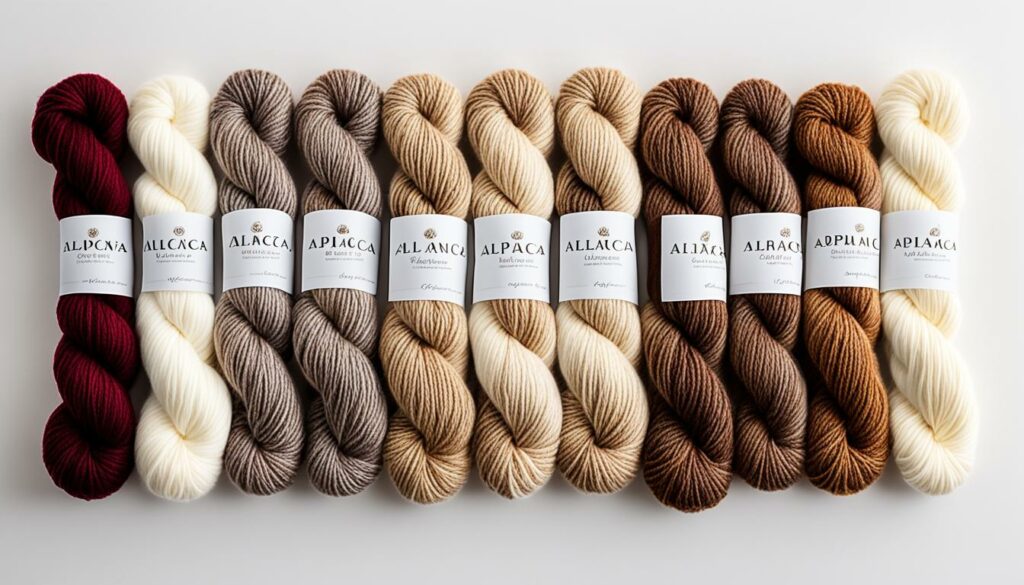
Whether you’re looking for affordable alpaca yarn skeins or indulging in luxury fibers, there are options available to suit various budgets and preferences. Take the time to explore different brands and fiber qualities before making your final purchase decision.
Benefits of Alpaca Yarn
When it comes to choosing the perfect yarn for your crafting projects, alpaca yarn offers a range of benefits that make it a top choice. From its exceptional softness and warmth to its hypoallergenic properties, alpaca yarn stands out among other types of yarn. Let’s explore the remarkable benefits of alpaca yarn and the unique properties of alpaca fiber.
1. Softness and Warmth
Alpaca yarn is renowned for its luxurious softness, providing a delightful tactile experience for both the maker and the wearer. The fine fibers of alpaca yarn create a delicate and gentle touch, making it incredibly comfortable against the skin. Furthermore, alpaca fiber has remarkable insulation properties, ensuring superior warmth even in cold temperatures. Whether you’re crafting cozy sweaters, scarves, or blankets, alpaca yarn will keep you snug and cozy.
2. Hypoallergenic and Gentle on the Skin
If you have wool sensitivities or allergies, alpaca yarn is an excellent alternative. Alpaca fiber is naturally hypoallergenic, making it suitable for individuals with sensitive skin or those prone to allergic reactions. The absence of lanolin, the substance found in sheep’s wool that often triggers allergies, makes alpaca yarn a comfortable choice for everyone. Crafters and wearers alike can enjoy the softness and warmth of alpaca yarn without any discomfort or irritation.
3. Moisture-Wicking Properties
Alpaca fiber boasts exceptional moisture-wicking properties, making it an excellent choice for garments and accessories. The unique structure of alpaca fiber allows it to absorb moisture without feeling wet or clammy against the skin. This moisture-wicking ability keeps the wearer dry and comfortable, making alpaca yarn ideal for activewear, socks, or any projects that require moisture management.
4. Natural Flame Resistance
One of the remarkable properties of alpaca fiber is its natural flame resistance. Alpaca yarn has a high ignition point, making it difficult to ignite and slow to burn. In the event of exposure to flames, alpaca fiber will self-extinguish, reducing the risk of accidents and providing peace of mind. This natural flame resistance makes alpaca yarn a safe choice for projects like baby garments, home decor, and items that require additional fire safety precautions.
5. Natural Sheen
Alpaca fiber showcases a natural sheen that adds a touch of elegance to finished projects. The inherent luster of alpaca yarn gives knitted or crocheted items a beautiful, luxurious appearance. Whether you’re creating a stunning shawl, sumptuous hat, or stylish sweater, the natural sheen of alpaca yarn will elevate your creations with a touch of sophistication.
With its unparalleled softness, warmth, hypoallergenic properties, moisture-wicking abilities, flame resistance, and natural sheen, alpaca yarn is an exceptional choice for all your crafting needs. Elevate your projects and indulge in the beauty and benefits of alpaca yarn.

Alpaca Yarn Production Process
Producing high-quality alpaca yarn involves a meticulous process that ensures the fiber’s purity and durability. Here’s a step-by-step overview of how alpaca yarn is created:
- Shearing: The first step in alpaca yarn production is shearing the alpacas to collect their fiber. This process is performed annually, typically during the spring, to obtain the finest and longest fibers. Professional shearers carefully remove the fleece to ensure a clean and uniform cut.
- Cleaning: Once the fibers are sheared, they undergo a thorough cleaning process to eliminate any impurities. The fleece is carefully washed to remove dirt, debris, and any remaining vegetable matter. This cleansing step is essential to prepare the fiber for further processing.
- Carding: After cleaning, the alpaca fiber may undergo carding, a mechanical process that aligns the individual fibers. Carding ensures a smooth and consistent texture, making it easier to spin the fibers into yarn. This step improves the overall quality and strength of the yarn.
- Spinning: The carded alpaca fibers are then spun into yarn. This can be done by hand using a spinning wheel or through specialized machines. During spinning, the fibers are twisted together to form a continuous strand, resulting in the creation of yarn. The spinning process determines the thickness and characteristics of the final yarn.
- Dyeing: Once the yarn is spun, it may undergo dyeing to add color and vibrancy. Alpaca yarn can be dyed using natural or synthetic dyes, offering a wide range of colors and shades. This step adds visual appeal to the yarn and allows for greater creativity in crafting projects.
- Packaging: After dyeing, the alpaca yarn is carefully packaged for sale. It is wound into skeins, which are pre-wound balls of yarn, ready for use by crafters and makers. The skeins are labeled with relevant information such as fiber content, weight, and color, enabling customers to make informed purchasing decisions.
Throughout the alpaca yarn production process, quality control measures are implemented to ensure that only the finest yarn reaches consumers. From shearing to packaging, every step is crucial in delivering premium alpaca yarn that embodies the exceptional qualities of this luxurious fiber.
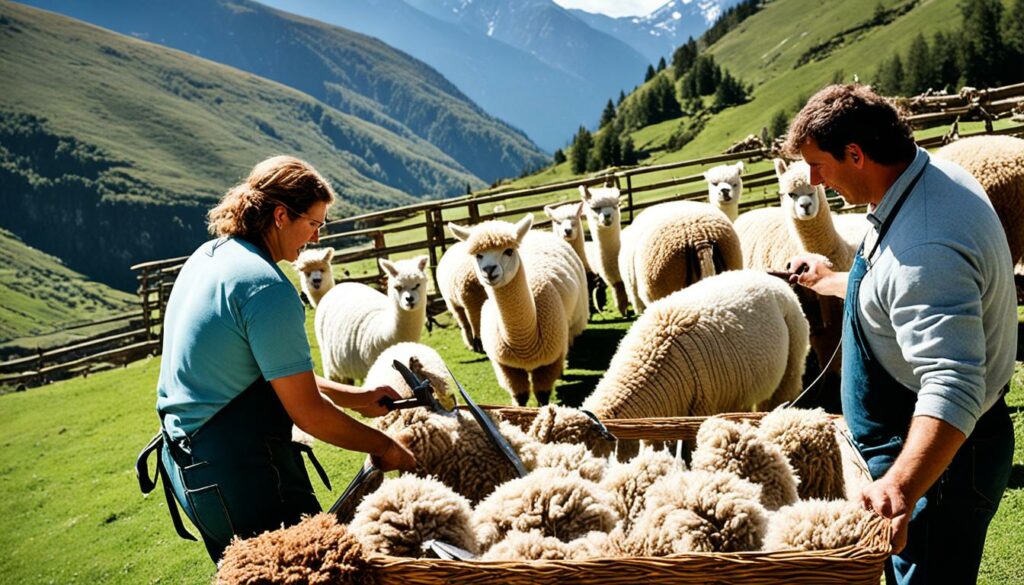
| Step | Description |
|---|---|
| Shearing | Alpacas are sheared to collect the fiber. |
| Cleaning | The fleece is cleaned to remove impurities. |
| Carding | Fibers are aligned by carding for smoother spinning. |
| Spinning | Fibers are spun into yarn, either by hand or machine. |
| Dyeing | Yarn may undergo dyeing for added color variations. |
| Packaging | Yarn is carefully packaged into skeins for sale. |
Factors to Consider When Buying Alpaca Yarn
When purchasing alpaca yarn, it is essential to take certain factors into consideration to ensure you select the perfect yarn for your project. Whether you are knitting, crocheting, or weaving, understanding these factors will help you make an informed decision. Let’s explore the key considerations when choosing alpaca yarn.
- Fiber Type and Blends
- Color and Texture
- Yarn Weight
- Yardage and Weight
Alpaca yarn comes in various fiber types and blends, each with its own unique characteristics. Consider the specific qualities you desire in your yarn, such as softness, warmth, and durability. For example, Huacaya alpaca yarn is known for its fluffy texture and excellent insulation, while Suri alpaca yarn has a silkier feel and luxurious drape.
Alpaca yarn is available in a wide range of beautiful colors and textures. Consider the color palette that best complements your project and the desired texture, whether you prefer a smooth and uniform yarn or one with an interesting twist or boucle effect.
Yarn weight refers to the thickness and heaviness of the yarn. Different projects require different yarn weights, so it’s important to choose a weight that is suitable for your intended use. Thicker yarns are ideal for warm and chunky projects like scarves and blankets, while finer yarns are better suited for delicate lacework or lightweight garments.
Check the yardage and weight of the alpaca yarn skein to ensure you have enough yarn for your project. Depending on the pattern and project size, you may need multiple skeins to complete your creation. Pay attention to both the total yardage and the weight of the skein to ensure you have adequate yarn for your desired project.
Care and Maintenance
Proper care of your alpaca yarn ensures its longevity and quality. Refer to the specific care instructions provided by the manufacturer, but in general, gentle hand washing is recommended. Use a mild detergent and cold water, being careful not to agitate or wring the yarn to avoid felting or stretching. After washing, gently squeeze out excess water and reshape the item to its original form. Lay flat to dry, and store your alpaca yarn in a cool, dry place away from direct sunlight to prevent fading or color changes.
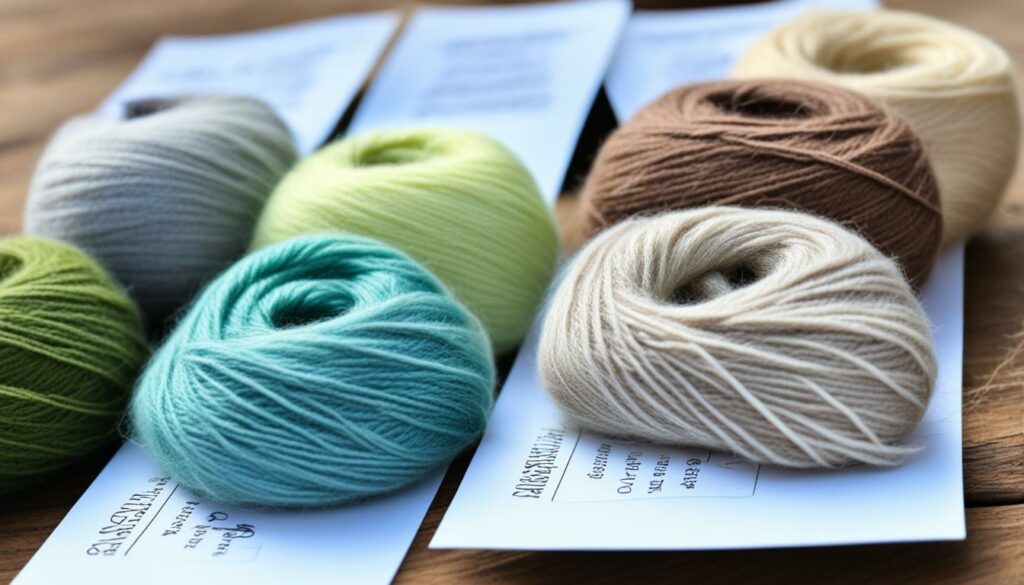
By considering these factors and taking proper care of your alpaca yarn, you can confidently choose the perfect yarn for your project and enjoy the luxurious qualities this fiber has to offer.
Where to Buy Alpaca Yarn
If you’re looking to buy alpaca yarn, there are several places where you can find a wide selection of options. Whether you prefer to shop in person or online, you’ll have plenty of choices to explore.
Local Yarn Stores
One great option is to visit your local yarn store. Many yarn stores carry alpaca yarn, allowing you to see and feel the yarn in person before making a purchase. The knowledgeable staff can also provide recommendations and answer any questions you may have.
Online Retailers and Marketplaces
Online retailers and craft marketplaces are another convenient way to find a variety of alpaca yarn options. Websites like Amazon, Etsy, and Ravelry offer a wide range of brands and colors to choose from. You can browse customer reviews and compare prices to make an informed decision.
Fiber Festivals and Events
If you prefer a more immersive experience, consider attending specialized fiber festivals or events. These gatherings often feature vendors selling alpaca yarn directly to consumers. It’s an opportunity to discover unique products, connect with fiber enthusiasts, and learn more about the world of alpaca yarn.
Directly from Farms or Breeders
For a more direct approach, some alpaca farms or breeders sell their yarn directly to consumers. This allows you to support small businesses and get yarn that is often produced locally. Before making a purchase, it’s essential to research the reputation and reliability of the seller to ensure a positive buying experience.
As you explore different sources for buying alpaca yarn, take the time to consider your specific needs and preferences. Look for reputable suppliers who offer a wide range of options to choose from, ensuring you find the perfect alpaca yarn for your next crafting project.
Tips for Caring for Alpaca Yarn
Proper care is essential for maintaining the quality and longevity of alpaca yarn. Here are some tips to help you keep your alpaca yarn in excellent condition:
- Hand Wash with Gentle Detergent: To clean your alpaca yarn, we recommend hand washing it using a gentle detergent and cold water. Avoid using harsh chemicals or bleach, as they can damage the fibers.
- Avoid Agitation and Wringing: When washing alpaca yarn, carefully avoid agitating or wringing the yarn, as this can cause felting or stretching. Instead, gently massage the yarn in the soapy water to clean it.
- Proper Drying: After washing, gently squeeze out excess water from the yarn. Reshape the item to its original shape and lay it flat to dry. Avoid hanging or wringing the yarn, as this can lead to distortion and stretching.
- Storage Tips: To store your alpaca yarn, choose a cool, dry place away from direct sunlight. This will help prevent fading or color changes over time. You can also consider placing a moth repellent, such as cedar blocks, near your yarn to protect it from pests.
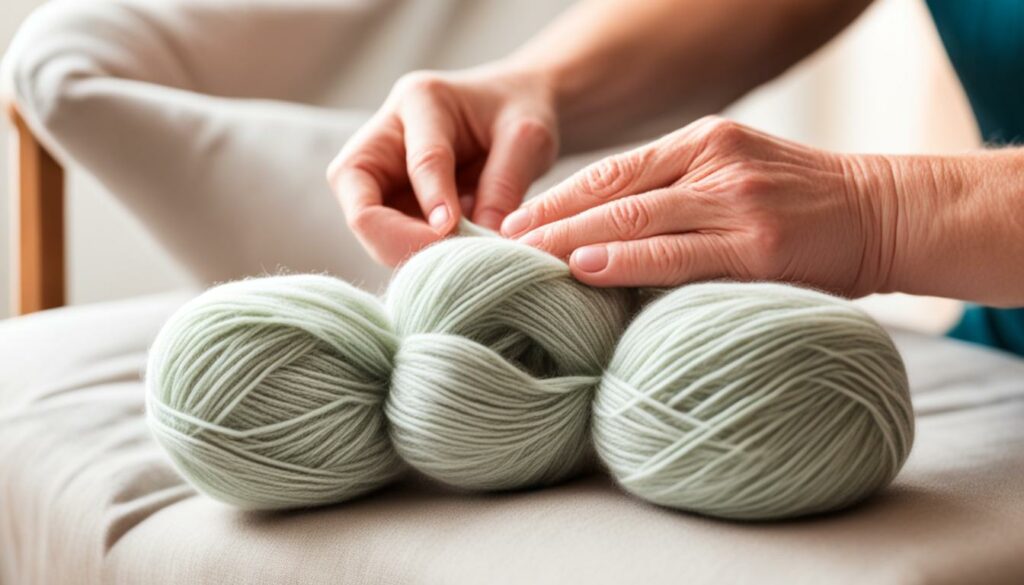
“Proper care is essential for maintaining the quality and longevity of alpaca yarn.”
By following these care tips, you can keep your alpaca yarn in optimal condition and ensure that your crafting projects retain their beauty and durability.
Conclusion
Alpaca yarn offers a luxurious and eco-friendly alternative to traditional wool yarn. Despite the higher cost associated with alpaca yarn, its unique properties and benefits make it a worthwhile investment for crafters and makers. The scarcity of alpaca fiber and the need to import it from countries like Peru contribute to its pricing, with factors like supply and demand playing a significant role.
When considering the cost of alpaca yarn, it’s essential to explore reputable brands that offer high-quality products. Brands like Yarns by Fiber, Fyberspates, Plymouth Yarn, Seattle Sky Dyeworks, and Hikoo are known for their exceptional alpaca yarn options. By purchasing from trusted suppliers, you can ensure that you’re getting a fair price for the quality of the yarn.
To make the most of your alpaca yarn investment, it’s crucial to take proper care of it. Follow the recommended care instructions, which typically involve gentle hand washing and air drying. By handling and storing the yarn correctly, you can preserve its softness, warmth, and durability for years to come.
In conclusion, alpaca yarn may come at a higher cost, but its exquisite qualities and eco-friendliness make it worth considering for your crafting projects. By understanding the factors influencing alpaca yarn pricing, exploring reputable brands, and caring for the yarn, you can enjoy the beauty and versatility of alpaca yarn in your creations.
